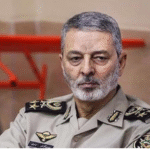By Jeffrey Stein
Beijing – As the conflict between Iran and Israel enters its fifth straight day, China has pointedly avoided direct involvement, emphasizing its commitment to peace and its limited capacity for power projection in the Middle East. While Beijing has accused the US of “pouring oil” on the fire with inflammatory rhetoric, experts believe China sees the conflict as a risky venture with little potential gain.
Chinese Foreign Ministry Spokesman Guo Jiakun on Tuesday criticized a social media post by former US President Donald Trump, stating, “Making threats and mounting pressure will not help to promote the de-escalation of the situation, but will only intensify and widen the conflict.” He was referring to Trump’s call for the immediate evacuation of Tehran.
Despite the strong words directed at the US, China has shown little inclination to actively mediate or intervene. According to China expert William Figueroa, Beijing “lacks the capability for power projection in the region and is not a key player in the traditional security sense.”
“China has no appetite to involve itself directly in this conflict, even if it had the capacity to do so, especially when an action carries high costs and offers little benefit,” Figueroa stated. He pointed out that while the conflict poses a potential risk to China’s energy security, the drawbacks of direct involvement outweigh the advantages.
Figueroa highlights China’s competitive advantage in the Middle East as primarily based on economic relationships and its ability to serve as a diplomatic bridge. However, in the case of the Iran-Israel conflict, he argues that existing communication channels, despite the unwillingness to engage, negate the need for Chinese diplomatic intervention.
“Iran and Israel are not short of communication channels — they are simply unwilling to talk. This leaves China with very little room to maneuver diplomatically,” Figueroa explained.
Instead, China is expected to maintain its current approach, supporting region-initiated efforts and acting as a facilitator for negotiations born from within the region itself.
“China prefers to act as a facilitator for negotiations that are generated from within the region itself. It does encourage diplomatic engagement, but China does not have the tools nor the diplomatic style to apply pressure in the way that, for example, the United States might,” Figueroa explained.
The recent Saudi-Iran deal, brokered with Chinese facilitation, serves as a prime example of Beijing’s preferred strategy: low-cost, high-reward diplomatic activity. The Iran-Israel conflict, on the other hand, presents the opposite: high cost and low potential gain, making direct Chinese involvement unlikely. China’s focus remains on maintaining stability and protecting its economic interests in the region, without becoming entangled in the complex political and security dynamics of the long-standing rivalry.









